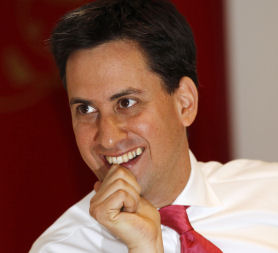Johnson’s appointment ‘both unexpected and inspired’
Ed Miliband’s choice of Alan Johnson as his new Shadow Chancellor was “both unexpected and inspired”, writes Labour’s former communications chief, Lance Price.

Naming the roles in his Shadow Cabinet was Ed Miliband’s first big decision as party leader. He didn’t have much say over who to appoint because they are elected by Labour MPs, but the allocation of jobs tells us quite a bit about how he hopes to take on the Coalition.
Making Alan Johnson Shadow Chancellor was both unexpected and inspired. The economy is far and away the biggest political issue and will be for a long time to come. Johnson’s populist touch and his easy way with words will contrast very well with George Osborne.
Alan Johnson sounds like a man of the people because he is one. It will make Osborne look even more like a member of a privileged elite than he does already. It’s not class war to set an ex-postman against a millionaire ex-public schoolboy but Johnson will look the part when it comes to standing up for the concerns of ordinary families as the cuts bite.
Ed Miliband has been generous to those who supported his brother for the leadership.
He is also likely to stick much more closely to the plans set out by the former Chancellor, Alistair Darling, to reduce the deficit over four years. Appointing Ed Balls to the main economic job would have been a dangerous gamble. The Tories would have painted it as two “Red Eds” for the price of one, both determined to carry on spending recklessly as if the debt didn’t exist.
Balls is a good fit for Shadow Home Secretary. He’s as ballsy as his name suggests and will give the Coalition a hard time if it starts to look soft on crime. He should remember that he’s got the very job that helped Tony Blair make his name in opposition.
Biggest disappointment
Oddly the big promotion for Balls’s wife, Yvette Cooper, is the biggest disappointment. Shadow Foreign Secretary sounds a great job, but it’s a step removed from the centre of the main political action. Her talents would have been more valuable at, say, health or education.
Elsewhere the Shadow Cabinet will have a lot of strong women, although several are relative unknowns and will struggle for a while to make an impact. Harriet Harman will be thrilled to get the overseas development post and will use it to argue that aid should go to those who need it most, not just to countries where Britain has an economic interest.
Ed Miliband has been generous to those who supported his brother for the leadership. Both Jim Murphy and Douglas Alexander, who ran David Miliband’s campaign, get big and well-deserved promotions.
Although the majority are elected, the new leader was allowed to appoint five members of the team. Interestingly he has gone mainly for experienced old-timers like Peter Hain and Shaun Woodward. His speech to the party conference said a “new generation” was now in charge but you wouldn’t know it from today’s appointments.
It does mean, however, that this looks like a Shadow Cabinet that is ready for a return to government, and serious about it. The biggest question mark is over Ed Miliband himself. He has yet to prove that he’s ready to be Prime Minister, but he has shown good sense and moderate instincts in forming his team and that augurs well for the future.